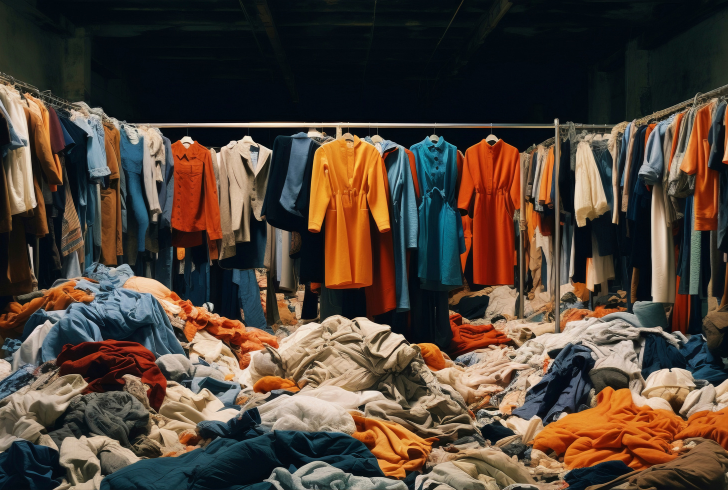The hunt for vintage treasures has evolved into a high-tech experience. Today’s resale platforms merge sustainability with innovation, using algorithms and interactive tools to make secondhand shopping feel like a fashion game. With AI filters and live auctions, the modern thrift world is as connected as it is conscious.
Still, sustainability doesn’t excuse excess. Experts remind consumers that secondhand doesn’t equal impact-free. Overbuying—whether new or pre-owned—still produces waste and adds emissions from shipping and packaging. True sustainability, they say, starts with buying less, not just buying differently.
The Rise of Tech-Driven Thrifting
Platforms like eBay, ThredUp, and The RealReal are transforming the secondhand industry. During eBay’s secondhand runway shows in New York and London, models showcased designer pieces that shoppers could buy in real time. According to Alexis Hoopes, eBay’s vice president of fashion, secondhand goods now make up 40% of the company’s total fashion sales.
“One of our top goals is to make secondhand shopping feel just as premium as buying new,” Hoopes said.
Apps like Whatnot have also gained momentum, letting users bid live for vintage and pre-owned items. However, the growing convenience of resale platforms can easily blur the line between sustainable fashion and excessive consumption.
When Sustainability Turns Into Overconsumption

Freepik | While secondhand shopping helps the planet it can still lead to overconsumption.
Meital Peleg Mizrachi, a Yale University postdoctoral fellow who studies textile waste, noted that secondhand shoppers often buy more clothes than those who only purchase new ones. “They tend to discard these pieces faster, which means more waste overall,” Mizrachi said.
According to the Council for Textile Recycling, fewer than 20% of donated garments are sold in thrift stores. The rest are either downcycled, exported, or sent to landfills. While online resale is greener than fast fashion, it still creates emissions through logistics and data processing.
Alana James, a fashion professor at Northumbria University, agreed that e-commerce comes with environmental costs. Yet, she emphasized that these are still minor compared to the impact of manufacturing new garments from scratch.
Shifting from Fast Fashion to Conscious Style
True sustainability in fashion isn’t just about where clothes come from—it’s about how we think about them. Experts stress that cutting back on impulse buying and resisting the churn of trend cycles is essential. The “haul” culture that dominates social media, with influencers boasting massive wardrobes, only fuels overconsumption.
“Thoughtful secondhand shopping means focusing on what you’ll actually wear,” says Katrina Caspelich, communications director at Remake. “Buy quality pieces, invest in longevity, and ignore the hype of constant trends.”
Spotting Quality in Secondhand Finds
Discerning shoppers know that fabric and construction make all the difference. Wisdom Kaye, a menswear creator, advises asking sellers about fiber content before purchasing. Natural textiles such as silk, cotton, bamboo, and wool not only age well but breathe and drape more beautifully.
Caspelich points to subtle signs of craftsmanship—like well-lined interiors and even seams. Vintage experts recommend prioritizing pre-1990s clothing, when quality control was higher and fabrics were heavier. As fashion historian Wesley Breed notes, “You can literally feel the difference in weight—that’s the mark of pre-outsourcing production.”
Finding Gems in the Digital Closet
Fashion creator Aimee Kelly says the secret to online thrifting is precision. She recommends narrowing searches by decade, color, and silhouette. “Patience really matters,” she says. “The best finds come to those who are willing to scroll a little longer.”
Once a great find lands in your hands, caring for it properly keeps it in rotation for years. Liana Satenstein, host of eBay’s Endless Runway secondhand show, recommends storing bags with stuffing to hold their shape, using garment bags, and placing lavender sachets in wardrobes to deter moths from eating natural fibers.
Clothing care extends to laundry habits, too. Wearing items multiple times between washes, spot-cleaning, and air-drying reduce both energy use and fabric wear. Even basic sewing skills can make a big difference. “Many people throw away sweaters just because a button fell off,” Caspelich noted.
Keeping Clothes in Circulation

Freepik | peoplecreations | Keeping clothes in circulation helps reduce waste and supports local communities.
Secondhand fashion doesn’t end with buying. What happens when clothes leave your closet matters just as much. Mizrachi encouraged giving away or selling items through small, local stores or shelters. “Those places appreciate donations the most,” she said.
Major retailers have begun embracing resale as well. Zara and H&M now run clothing recycling programs, while eBay recently teamed up with British retailer Marks & Spencer for a take-back initiative. The partnership allows customers to return old pieces in-store to be resold online, extending each garment’s life cycle.
A New Direction for Sustainable Style
Ultimately, the greenest fashion choice remains simple: buy less. Mizrachi believes that consumer behavior has the power to reshape the industry. “Fashion brands will only change when overconsumption stops being profitable,” she said.
Sustainable shopping isn’t just about secondhand bargains; it’s about shifting priorities. With a thoughtful approach, every purchase can support both personal style and the planet. True fashion longevity comes not from chasing the next trend but from valuing what already exists.




